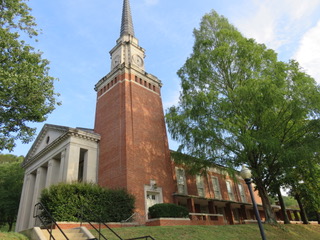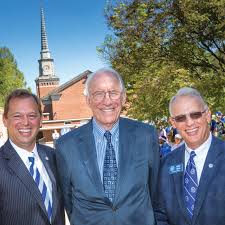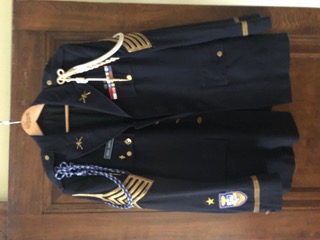
McCallie Chapel

Spencer McCallie III, center

Doug Campbell

Doug Campbell’s McCallie uniform

Curt Robinson

Ward Nelson

1928 newspaper article
This spring marks the 50th anniversary of an important moment from the past for the local independent schools’ community.
At the end of the 1969-70 school year, McCallie School decided to drop its military curriculum that had been so much a part of its image and operation, while planning to continue and even expand its college preparatory academic and other extracurricular programs.
Fellow independent boys school Baylor would follow suit a year later and would also begin admitting girls as students in 1985.
For those roughly 60 and older, the McCallie decision – which was announced in the local newspapers in late March 1970 -- would mark the end of an era of seeing McCallie and Baylor students in their uniforms around town and at houses of worship.
McCallie in the late spring of 1970 would also march in its last Armed Forces Day Parade and its last annual Mothers’ Day parade at the school, which that year was held on Friday, May 8.
And roughly 50 years ago this week, it held its final commencement and graduation exercises as a military school, with Boyd Steward being recognized as the valedictorian.
According to retired headmaster Spencer McCallie III, who was then working in admissions for McCallie, the decision was actually due to several factors.
One that is obvious to those who lived through or studied that era was the changing perspective of the military during the Vietnam War.
McCallie, like Baylor, had added its military curriculum during World War I in part to get young men ready for service.
It remained as a popular way to add discipline and positive team skills to a young boy’s life along with studies and athletics, so the school kept it. And with such justifiable wars as World War II and, to a lesser extent, the Korean War coming along, it remained as good preparation.
But then when the more controversial Vietnam War began escalating by the mid-1960s and people questioned whether America should be involved to stop the spread of Communism thousands of miles away, some people began to have different views of military life.
And that included perspectives of military schools. Although most parents around the mostly conservative Chattanooga area still saw and accepted the values of a military school, the institutions’ reputation in general outside of Chattanooga was that some were becoming almost like reform schools.
“As director of admissions, I had a judge in Alabama ask to remand a juvenile delinquent to our care,” said Mr. McCallie. “I said that we did not take juvenile delinquents. He said, ‘But you are a military school aren’t you?’ ”
As a result, he said McCallie had to begin seriously looking at its future.
“The issue of dropping the military was a serious one for both McCallie and Baylor, though neither school had been founded with a military program,” Mr. McCallie added. “Both schools had a long tradition with that program, and both faced the same issues with it at the same time.”
Another issue that has been almost forgotten over the years was that McCallie and Baylor at that time were wanting to expand some of their academic and other extracurricular offerings, but roughly an hour or so of each day on average was devoted to military training.
“It took away from other activities, including academics,” Mr. McCallie said. “Both schools wanted to have more time for academic courses, especially in the sciences and mathematics.”
Despite being rival schools, both Baylor headmaster Charles Hawkins and then-headmaster Dr. Spencer McCallie Jr., the father of Spencer III, had some conversations together over trying to figure out how to resolve their common situation.
“Here is an interesting twist,” Mr. McCallie III remembered. “Hawkins told my father that Baylor would drop the military the next year and that would make it easier for McCallie to drop it after that.
“What actually happened was that Hawkins was let go by Baylor, maybe because he got ahead of his board and spoke before they had made a decision.”
According to the late Baylor teacher James Hitt’s 1971 school history, “It Never Rains After Three O’Clock,” Mr. Hawkins had some progressive ideas. Besides dropping the military, he also wanted to make Baylor coed, add an elementary department and possibly a junior college, racially integrate the faculty and greatly lessen the boarding student population.
In October 1969, he had sent a letter to alumni and school patrons endorsing the idea of Baylor dropping the military. But the idea backfired, as it resulted in criticism and other comments from some alumni who liked the military and from others who were not ready to move so fast.
As a result, Baylor decided to study the issue more thoroughly, and new board of trustees chairman Jack Lupton announced that Baylor would continue with the military curriculum.
Mr. Hitt wrote that Mr. Hawkins later ended up leaving Baylor, quoting the headmaster as saying the parting was not personal, but simply over differences of opinion with the board regarding the future of the school.
Mr. Hawkins, who was actually a military veteran but opposed the Vietnam War, went on to become a popular administrator and teacher at Deerfield-Windsor School in Albany, Ga., where he lived until his death in 2012 at the age of 88.
Because of the Baylor situation, McCallie ended up having to face the military issue alone for the time being, and the school went about it in more of a meticulous and methodical way.
As Mr. McCallie III remembered, “The McCallie board asked for a series of reports from those of us in admissions, athletics and academics and then set up a debate between two teams of teachers and coaches, one to keep military and one to drop it. They also wanted good information on what would replace its time slot.”
He recalled that only board members were present for the final discussion and vote, the results of which were publicly announced with about two months left in the school year.
“I never learned whether it was close or not,” he said. “But it was the right decision. Baylor then dropped their military program the next year.”
Emphasizing further that it was the right step, Mr. McCallie said that within five years, McCallie’s enrollment had increased by 20 percent, and the number of staff had increased by 40 percent.
“The boys were taking more courses and there was a renaissance of sorts in extracurricular activities,” added Mr. McCallie, who had the renovated quadrangle at the school named in his honor in 2015.
While the dropping of the military was a momentous time for the administration and board of McCallie, among students at the time, it seemed to have been taken much more in stride and with little emotion.
Local attorney Doug Campbell was a senior in 1970 and does not recall anything happening of a significant nature when the announcement was made. He said he naturally saw both sides of the issue, pointing out that McCallie was not a strict military school, in which the curriculum entered all phases of school life.
“The consensus at the time was it (the military curriculum) ought to go,” he recalled this week. “But looking back in hindsight, you see some of the values it had.”
He recalled that a period devoted to the military would be held each day, and they might do everything from march, to stand in formation, to practice taking apart and cleaning an M1 rifle.
Mr. Campbell also liked how the uniforms equalized the McCallie student community in social status. “Because everybody wore the same thing to school every day, it made it much more of a classless society.”
As a memento, he still proudly possesses his old dark blue McCallie military blouse/coat with his nametag on it.
Curt Robinson graduated in 1971 as part of the school’s first non-military senior class the next year, and he recalls that for a short time, students could choose between continuing to wear their uniforms or the new blazer, slacks and tie look.
He opted for the former, but it was for convenience instead of look or pride.
“Wearing the uniform gave me an extra 5 or 10 minutes of sleep every morning,” he recalled with a laugh.
A multi-sport athlete at McCallie who went on to wrestle at Georgia, he remembered that the change did not seem to be that big an issue with most students.
“In my senior year, it was one less obligation,” said Mr. Robinson, an executive at the family’s longtime business, Top Flight writing paper products. “It was not a huge disappointment to me. But I’m sure there were students on the fast track to be brigade commanders and they had worked hard and didn’t get to see that come to fruition.”
He also still has plenty of good memories of his own from the military days, from marching in the Armed Forces Parade – often behind the popular Howard or Riverside High marching band – to practicing marching on the McCallie field next to the old Central High across a fence.
“The Central kids would sometimes throw rocks at us,” he jokingly said.
He added that he had actually first tasted military school life as a youngster visiting his grandfather at Riverside Military Academy in Gainesville, Ga., where he was employed.
By 1975, the high school world was beginning to change further, as long hair was becoming popular among students at McCallie and elsewhere. As a result, the days of McCallie as a military school were moving farther into the past, although the preparatory school at the foot of Missionary Ridge was continuing to expand its academic, extracurricular and sports programs.
Graduating that year was the last McCallie class with any connection to the military program, at least for those who had started in the fall of 1969 in the seventh grade.
Among them was local attorney Ward Nelson, who by the mid-1970s was a standout football player and wrestler at McCallie and would go on to become a Morehead (now Morehead-Cain) Scholar at the University of North Carolina.
He admitted to getting only minimal exposure to the military curriculum during that 1969-70 year, but still remembers some from that time.
“I was too young to resent it yet,” he said with a laugh while remembering that it was challenging both mentally and physically and that several guys would faint while marching on scorching afternoons on the football field.
The military days at McCallie have long since passed, but the memories apparently still march on in the minds of those who lived through them.
* * * * *
Even Earlier McCallie history:
Spencer McCallie III also recently forwarded a photograph of a July 1, 1928, Chattanooga Times article under the headline, “Quintette of Master Chattanoogans.”
The story offered brief profiles of five local private school, college and church leaders at the time. They were Dr. T.S. McCallie of Central Presbyterian Church, McCallie co-headmasters Dr. Spencer J. McCallie Sr. and Dr. James Park McCallie, Dr. Arlo Ayers Brown at the University of Chattanooga, and Baylor School headmaster Alexander Guerry Sr.
Mr. McCallie III said Dr. T.S. McCallie was the municipal spiritual guide by special appointment of the Chattanooga City Commission.
“When he died in 1936, the city requested that the family have a funeral in the Memorial Auditorium because there was no church in the city that could handle the expected crowd,” he said. “They were correct.”
He also said the minister was a Red Cross executive.
He said Dr. Spencer McCallie Sr., his grandfather, was Chattanooga’s eloquent booster, and that Dr. James Park McCallie was Professor John Roy Baylor’s first honor student while he attended Baylor shortly after it opened in 1893.
“He admired Mr. Baylor very much and went to Mr. Baylor’s university of Virginia. When he left at the train station, Mr. Baylor was there with a gift of books,” Mr. McCallie III said of his great-uncle, who actually lived until 1971 – one year beyond the dropping of the military curriculum.
In 1905, Park and Spencer McCallie would open McCallie School, and it was primarily due to having worked at another school in Indiana.
“Park and Spencer founded McCallie on the basis of Park‘s experience at Culver Military Academy, which was a full preparatory school,” he said. “It had gymnasiums, fields, many activities, and dormitories. Mr. Baylor was still running an academy, a fine leader with a few young teachers and little else.”
Professor Baylor later saw how well McCallie was doing on its nice campus on the old family farm at the foot of Missionary Ridge that he later began expanding Baylor into more of a prep school with sports and other offerings, Mr. McCallie said.
This expanded even further with the move from the somewhat confined campus in the area of Palmetto and Oak streets by Fort Wood to the sprawling current and scenic campus by the Tennessee River and Signal Mountain in 1915.
And the prep school transition expanded even further, Dr. McCallie III pointed out, by the hiring of one of the others profiled in the 1928 article – Alex Guerry Sr.
“Alex Guerry began his career at McCallie, so he was a natural when Baylor had to adjust to the prep school model,” Mr. McCallie III recalled, adding that Mr. Guerry had been an American Legion leader due to his service in World War I and was a forceful civic leader.
Of UC head Dr. Brown, Mr. McCallie III called him a “dominant civic leader.”
* * * * *
Jcshearer2@comcast.net